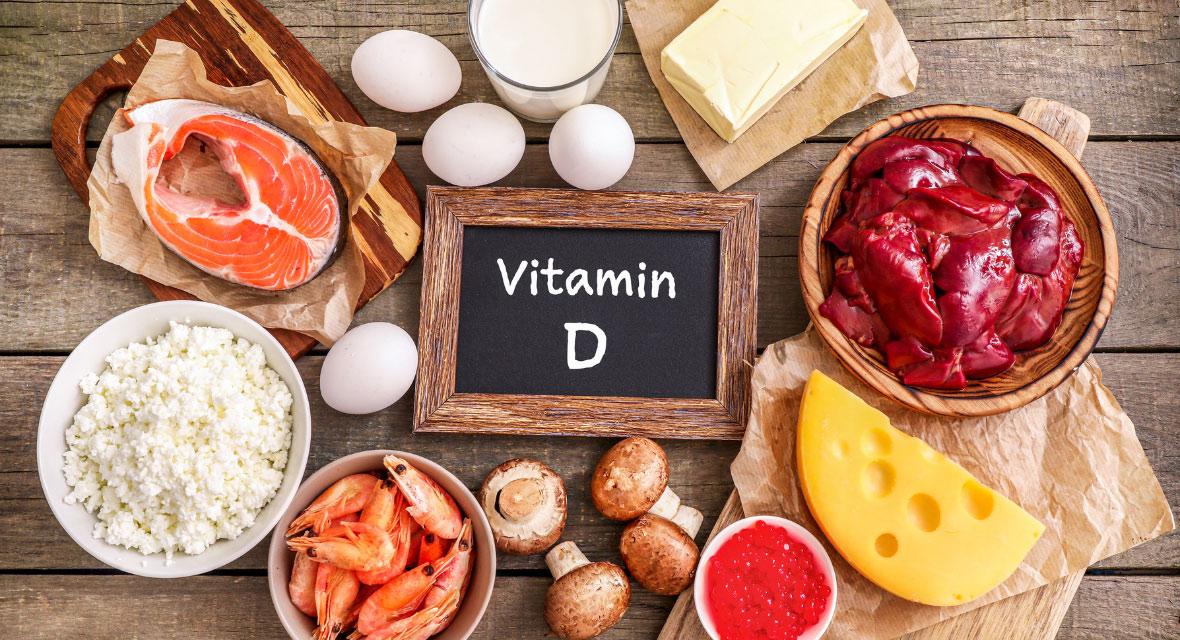🏆 As seen and loved on Shark Tank Dubai 🏆

Health Benefits of Vitamin D
The Health Benefits of Vitamin D You Must be Aware of
It is no secret that vitamin D is a vital nutrient, that you can derive if you spend time in the sun. Breakfast staples, such as eggs, milk, and orange juice, etc. have ample amounts of this vitamin. Certain mushrooms and fatty fish, such as halibut, salmon, and herring are also available to you as a source of vitamin D.
At VMeals, we prepare wholesome meal plan UAE that can provide you with an adequate amount of this sunshine compound while staying indoors.
There is no doubt about the role of vitamin D in maintaining healthy bones by promoting calcium and phosphorus absorption into the body. Researchers say that if you have a deficiency of this compound, it can lead to soft bones (osteomalacia) or fragile bones (osteoporosis), particularly during old age.
Lack of vitamin D can lead to thin, brittle, or disfigured bones. Calcium absorption can be promoted by maintaining an adequate amount of this compound, making it necessary for bone growth and bone restoration.
Increasing evidence recently shows that vitamin levels are also related to an increase in the risk of diabetes, muscle and bone pain type 1, breast, colon, prostate, ovarian, esophageal, and lymphatic cancers, and perhaps more serious diseases.
Vitamin D-How is it different from others?
It's important to know, that it's an uncommon vitamin. In fact, it is one of only two vitamins that our body can prepare on its own, the other being vitamin K, which is synthesized by the good bacteria living in our gut. Vitamin D has many types, but D2 and D3 are essential ones for our body.
Benefits of vitamin D on your health
Aids in weight loss
Obesity can be one of the main reasons for vitamin D deficiency in your body. Studies suggest that obesity limits the body's capacity to absorb and use this vitamin both from sunlight and foods, as the fat cells restrict the release and hold on to the vitamins.
Aids in bone health
Vitamin D helps with calcium absorption. Without enough vitamin D, there will be a lack of the active form of calcium, the hormone calcitriol. A sufficient level of this component, as well as the phosphate, can be maintained by the body's calcium absorption and both support the growth and maintenance of healthy, strong bones.
It is therefore critical to get enough vitamin D to prevent bone diseases such as childhood rickets, adult osteomalacia, and elderly osteoporosis.
Vitamin D helps strengthen muscles
In addition to its bone-building capabilities, vitamin D also impacts muscle strengthening. A deficient vitamin D body can weaken muscles, which in turn increases the risk of falls. This is predominant in older adults. Proper intake of this vitamin can aid in muscle building and help prevent severe fall injuries that can lead to disabilities.
Mitigate seasonal disorder symptoms (Seasonal Depression)
Researchers believe that a person's vitamin D level could be a part of the risk of seasonal affective disorder or seasonal depression. Less vitamin D may influence neurotransmitter activity, which appears to be found in people with seasonal affective disorder.
You may feel blue or more vulnerable to mood disorders if you drop the serotonin level. Serotonin is the chemical in your brain that gets released when you eat a bit of chocolate or hold the person's finger that you love. It is a mood enhancer chemical.
But with low levels of vitamin D in your body, may create a hurdle in the release of serotonin, eventually leading to depression. Our team of world-class master chefs follows the daily requirements of nutrients in preparing meals, that can help you restore the lost levels of this happy hormone.
Helps Heal Respiratory Diseases
If you are in shortfall of this vitamin, you may experience respiratory infection (e.g., colds and flu) more than normal. Increase your vitamin D level immediately to heal your disease.
Going out as much as possible and soaking yourself in the healing properties of sunlight during the morning hours by taking a walk or exercising in the garden or other similar healthy hobbies can be extremely beneficial. Also, add a healthy diet to your routine to boost immunity.
Protection from Heart Problems and Stroke
Many studies show that adequate vitamin D was associated with a reduced risk of cardiovascular disease, strokes, and heart failure. It is said that even a slight reduction in the level of this vitamin can shoot up blood pressure in patients.
This sudden surge in blood pressure can lead to organ damage. To mitigate such risk, it's always advisable to consume vitamin D-rich meals.
Diabetes type 2 risk reduction
Vitamin D may increase insulin sensitivity, boosts beta cell function, and reduce inflammation—all potential benefits for reducing the risk of and supporting the management of type 2 diabetes.
Contribute to cancer death reduction
The potential role of vitamin D in preventing cancer is being given increasing attention by scientists. A study analyzing the potential links between this vitamin and breast cancer, colon cancer, ovarian cancer, and cancer of the prostate, has yielded promising results.
Aid to prevent cognitive and dementia decline
In the case of vitamin D receptors, doctors state that it can play a vital role in cognitive function and, potentially, in reducing the risk of dementia. Because of its neuroprotective properties, it is hailed as a factor that promotes brain health.

What Deficiency of Vitamin D Can Do to Your Body?
Certain foods contain this compound naturally like egg yolk, mushrooms, and fatty fish like tuna. But some foods are also fortified with this vitamin like fortified milk, and other dairy products like yogurts, orange juices, etc.
Indeed, the amount of vitamin D in a particular food item is displayed on food labels in packaged foods. It can be difficult to get enough vitamin D from your diet, particularly for vegans or people who suffer from lactose intolerance. This is why we suggest the inclusion of a variety of nutrients in your balanced diet. A range of healthy foods among different food groups is always important to eat.
The daily vitamin D needed varies with age. You may be suggested lower or higher doses according to your personal needs once our dieticians check your blood levels.
The dieticians may ask you to go for a blood test if you have osteoporosis to trace the level of Vitamin D. The meal plans can be tailored to the level of vitamin D based on the results for each person. That's why we always encourage our clients to discuss their individual needs with our expert nutritionists.
Bottom Line
Vitamin D is an essential nutrient that can help strengthen bones and maintain their strength while reducing the risk of cancer in certain people. However, consuming too much vitamin D can be toxic. Toxicity signs include poor appetite, constipation, nausea, vomiting, weakness, and weight loss.
Kidney damage too has been associated with high levels of vitamin D in the body. Higher levels of this compound can also increase the level of calcium in your blood. Too much blood calcium (hypercalcemia) can cause bafflement, uncertainty, and problems with heart rhythm.
Most cases of vitamin D toxicity happen when someone overuses vitamin D supplements. Excessive sun exposure doesn't cause vitamin D poisoning.
Hence, take steps to achieve the recommended daily nutrient content through food and sunlight, instead of gulping down supplements. The suggested daily consumption of vitamin D is 600 to 800 IU for adults and 400 IU for children.
Talk to our experts about receiving a blood test to check that your level is adequate if you suspect to have a vitamin D deficiency. You can also contact us for various healthy meal plans to get sufficient quantities of this essential vitamin without worrying about crossing the recommended levels.
Reach out to start your fitness journey with us!
Meal Plans
Delivery Details
Legal Information
© 2020-2026 VMeals. All rights reserved. VMeals™ is a trademark of Flip Side Restaurant and Cafe L.L.C
We accept
